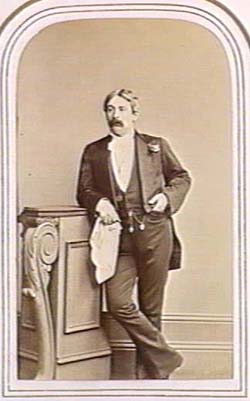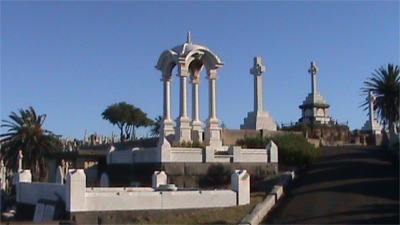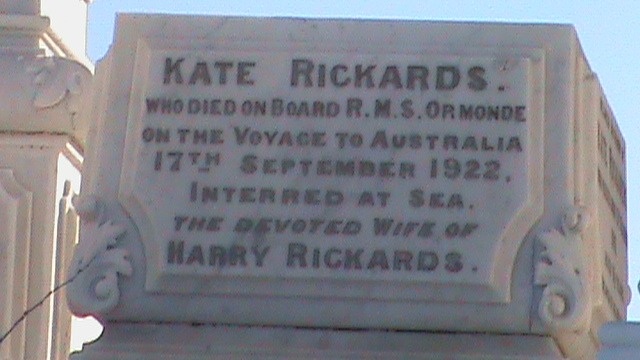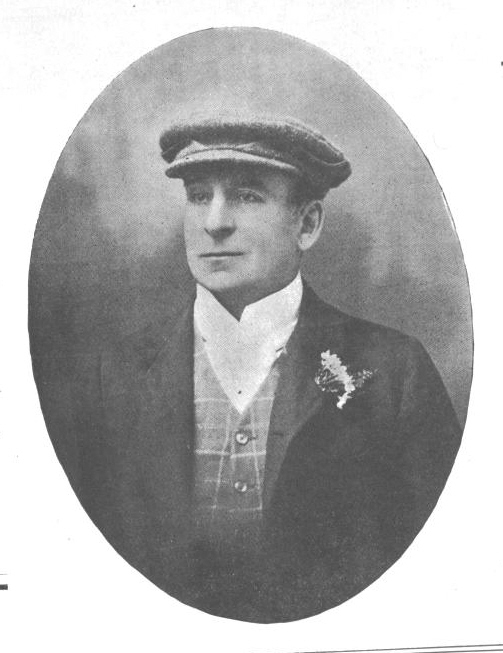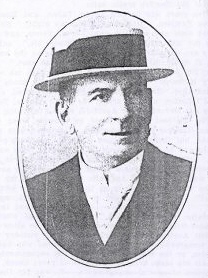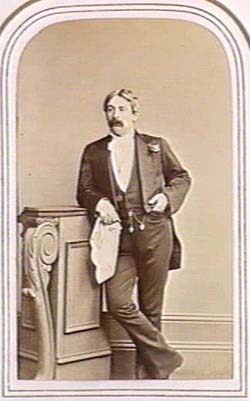As 'Harry Rickards', Leete was engaged as a vocalist at Wilton's Music-Hall for £2 a week; Charles Morton, proprietor of the Canterbury and Oxford music-halls in London, was soon paying him £20 a week. Rickards 'had a beautiful baritone voice' (his first hit as a 'Lion Comique' was 'Captain Jinx of the Horse Marines') and a very long, very black 'drooping, silky moustache', twisted into corkscrews on the stage. Later he was clean-shaven and somewhat portly, but always debonair.
With an established reputation, having appeared before the Prince of Wales, Rickards reached Melbourne on 28 November 1871 with his wife and opened at St George's Hall on 9 December. Using sketches written by Garnet Walch, he alternated between Sydney and Melbourne and made two long Australasian tours. In debt, the Rickards went to California in 1874. Leaving his wife, Harry toured the United States of America and returned to England in May 1875. He took a company to South Africa (1876), worked the English circuit and played leading roles in pantomime in the provinces for ten years. In 1879 his wife divorced him. At Chorlton, Manchester, on 24 November 1880 he married Kattie (Kate) Roscoe (d.1922), an expert acrobat and trapeze artiste, known professionally as Leete.
The Rickards-Leete Combination toured Australasia in 1885-86, opening in Melbourne in Bric-a-Brac, written by Walch. Returning in 1888 with his brother John Charles Leete as manager, they played continuously until Harry left for England in March 1891. He returned in May next year with a new company, now including his daughter Noni. A true Cockney, 'Arry 'always sang six or seven songs nightly, each quite different in character, and clothed accordingly'. He was famous for his renditions of Cockney songs such as 'Broccoli and Cabbages' and 'Knocked 'em in the Old Kent Road'.
Late in 1892 Rickards made Sydney his headquarters. On the shrewd advice of his wife he leased the Garrick Theatre: renamed the Tivoli, it opened on 18 February 1893. Building up the Tivoli circuit, he leased the Melbourne Opera House (from 1895 and rebuilt it in 1901) and theatres in Adelaide, Brisbane and Perth. He bought the Sydney Tivoli and adjacent hotel in 1899 for £9000; destroyed by fire in September, the theatre re-opened on 12 April 1900.
Notoriously unpunctual, 'gushing, good-natured, and keen as a hawk', Rickards outsmarted his rivals and established a virtual monopoly. From 1895 he went overseas annually, visiting music-halls in search of turns. He brought the cream of variety artists to Australia: acrobats, ventriloquists, instrumentalists, impersonators, singers and animal acts, including the legendary Marie Lloyd, Little Tich, Houdini, the quasi-Chinese conjuror Chung Ling Soo and Paul Cinquevalli, the unrivalled juggler. Rickards paid his artists generously.
His interstate interests and frequent visits to England gradually weaned him from stage appearances. About 1904 Rickards acquired a large house, Canonbury, on Darling Point, and in 1908 an English estate near Margate, Kent. He collected paintings and sculpture. Generous, the Rickards gave annual Christmas dinners for the poor in Sydney.
A diabetic, Rickards died of apoplexy on 13 October 1911 at Croydon, England, and was buried in Waverley cemetery, Sydney. His wife and two daughters survived him and inherited his estate, valued for probate at over £135,000 in Australia and £10,000 in England. By 1911 Rickards was probably 'the largest single-handed music hall manager and proprietor in the world'.
As 'Harry Rickards', Leete was engaged as a vocalist at Wilton's Music-Hall for £2 a week; Charles Morton, proprietor of the Canterbury and Oxford music-halls in London, was soon paying him £20 a week. Rickards 'had a beautiful baritone voice' (his first hit as a 'Lion Comique' was 'Captain Jinx of the Horse Marines') and a very long, very black 'drooping, silky moustache', twisted into corkscrews on the stage. Later he was clean-shaven and somewhat portly, but always debonair.
With an established reputation, having appeared before the Prince of Wales, Rickards reached Melbourne on 28 November 1871 with his wife and opened at St George's Hall on 9 December. Using sketches written by Garnet Walch, he alternated between Sydney and Melbourne and made two long Australasian tours. In debt, the Rickards went to California in 1874. Leaving his wife, Harry toured the United States of America and returned to England in May 1875. He took a company to South Africa (1876), worked the English circuit and played leading roles in pantomime in the provinces for ten years. In 1879 his wife divorced him. At Chorlton, Manchester, on 24 November 1880 he married Kattie (Kate) Roscoe (d.1922), an expert acrobat and trapeze artiste, known professionally as Leete.
The Rickards-Leete Combination toured Australasia in 1885-86, opening in Melbourne in Bric-a-Brac, written by Walch. Returning in 1888 with his brother John Charles Leete as manager, they played continuously until Harry left for England in March 1891. He returned in May next year with a new company, now including his daughter Noni. A true Cockney, 'Arry 'always sang six or seven songs nightly, each quite different in character, and clothed accordingly'. He was famous for his renditions of Cockney songs such as 'Broccoli and Cabbages' and 'Knocked 'em in the Old Kent Road'.
Late in 1892 Rickards made Sydney his headquarters. On the shrewd advice of his wife he leased the Garrick Theatre: renamed the Tivoli, it opened on 18 February 1893. Building up the Tivoli circuit, he leased the Melbourne Opera House (from 1895 and rebuilt it in 1901) and theatres in Adelaide, Brisbane and Perth. He bought the Sydney Tivoli and adjacent hotel in 1899 for £9000; destroyed by fire in September, the theatre re-opened on 12 April 1900.
Notoriously unpunctual, 'gushing, good-natured, and keen as a hawk', Rickards outsmarted his rivals and established a virtual monopoly. From 1895 he went overseas annually, visiting music-halls in search of turns. He brought the cream of variety artists to Australia: acrobats, ventriloquists, instrumentalists, impersonators, singers and animal acts, including the legendary Marie Lloyd, Little Tich, Houdini, the quasi-Chinese conjuror Chung Ling Soo and Paul Cinquevalli, the unrivalled juggler. Rickards paid his artists generously.
His interstate interests and frequent visits to England gradually weaned him from stage appearances. About 1904 Rickards acquired a large house, Canonbury, on Darling Point, and in 1908 an English estate near Margate, Kent. He collected paintings and sculpture. Generous, the Rickards gave annual Christmas dinners for the poor in Sydney.
A diabetic, Rickards died of apoplexy on 13 October 1911 at Croydon, England, and was buried in Waverley cemetery, Sydney. His wife and two daughters survived him and inherited his estate, valued for probate at over £135,000 in Australia and £10,000 in England. By 1911 Rickards was probably 'the largest single-handed music hall manager and proprietor in the world'.
